Warm Up Your Space: When Outside's Frightful, Make Indside Delightful
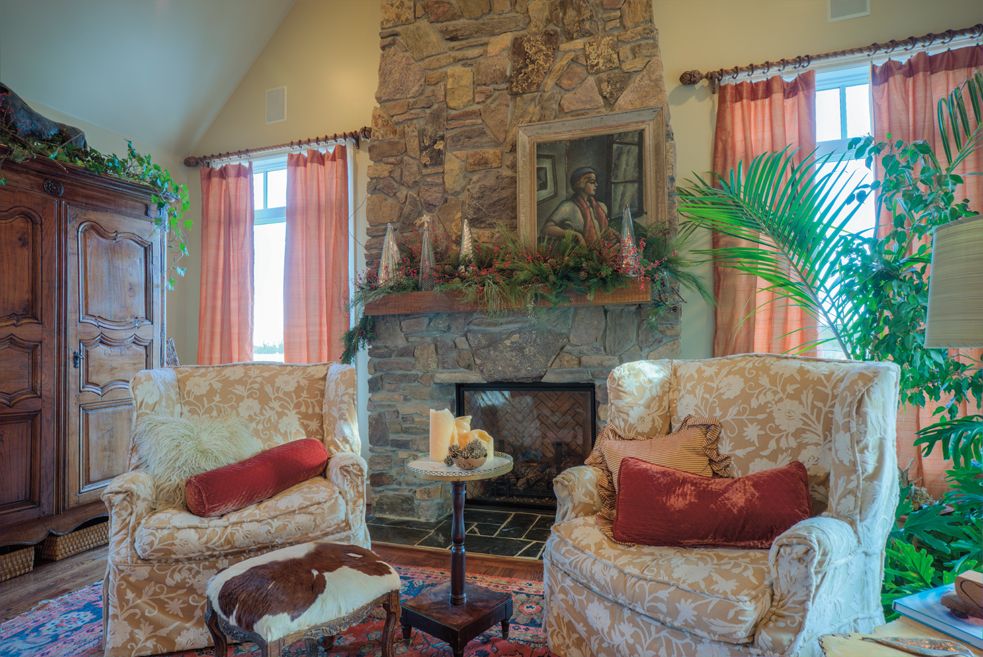
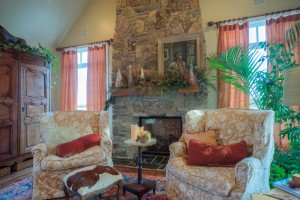 To me, the rewards of winter—holidays, mugs of hot cocoa, a roaring fire—have never seemed worth the downsides of the season. The days are dark, parkas aren’t flattering, and no matter how many pairs of fingerless gloves I knit, my hands are always cold. I’d love to be the type of person who embraces all four seasons, but by early December of each year, I’m usually daydreaming about spring.
To me, the rewards of winter—holidays, mugs of hot cocoa, a roaring fire—have never seemed worth the downsides of the season. The days are dark, parkas aren’t flattering, and no matter how many pairs of fingerless gloves I knit, my hands are always cold. I’d love to be the type of person who embraces all four seasons, but by early December of each year, I’m usually daydreaming about spring.
But there’s hope for those of us who aren’t seasonally inclined. Winter can be the perfect time to decorate, and I’m not just talking about decking the halls. Think beyond red and green and make changes that inspire you to embrace winter’s dark nights and cold mornings. If you focus on creating a warm, well-lit home that encourages conversation, cuddling and catnaps, you may decide winter’s not quite so bad after all.
Create Space for Conversation
Take a good look at your furniture placement as you approach the winter months. Does the arrangement of your sofa, armchairs and occasional chairs facilitate conversation? If not, it’s time to reconfigure your space.
Resist the urge to position your furniture along the walls of your room; instead, create clustered seating arrangements that lend themselves to tête-à-têtes. Placing two chairs opposite a sofa can create a nice sense of balance. Or try positioning two sofas across from each other. The key is to create a sense of intimacy when friends and family sit down to talk.
Designers recommend taking a tape measure to your furniture arrangements; ideally, in a grouping, no piece of furniture should be more than eight feet away from any other. If you’ve done your job right, you should be able to get away with only one coffee table in a grouping, but that doesn’t mean skimping on end tables and nesting tables. Confirm that no chair or sofa is more than 18 inches away from a solid surface. On a cold winter night, a cup of hot tea should always be within an easy arm’s reach.
 If you’re lucky enough to have a fireplace, embrace it. People are prone to put the flat-screen television at the center of their seating arrangements, but particularly in the wintertime, it’s worth resisting the urge. The cold weather provides the perfect excuse to focus on the hearth.
If you’re lucky enough to have a fireplace, embrace it. People are prone to put the flat-screen television at the center of their seating arrangements, but particularly in the wintertime, it’s worth resisting the urge. The cold weather provides the perfect excuse to focus on the hearth.
For living rooms that are long enough, consider breaking the room into zones. Think about the indoor activities your family enjoys. Is there a surface for your kids to do jigsaw puzzles? What about a well-lit nook where you can curl up with a book? Creating these special spaces doesn’t necessarily mean buying all new furniture. Try rearranging what you have and borrowing from other rooms when you need to. The goal is to come up with an arrangement that maximizes the great indoors.
Let in the Light
One of the most prescribed treatments for people who suffer from seasonal affective disorder is light. Doctors recommend people get at least 30 minutes of it a day. Sunlight helps boost the production of melatonin, which can in turn improve people’s moods.
There are lots of ways to improve indoor lighting in the winter months. Some are simple to execute but often overlooked. For starters, open your blinds every day. Trim the trees and shrubs that have grown in front of your windows during the summer months. And turn on the lamps you’ve already got.
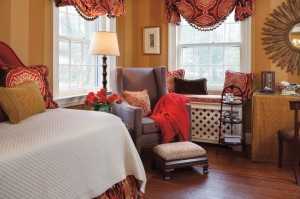 One of the biggest lighting mistakes people make is relying on a single light source—like a ceiling-mounted fixture—to do the work of four or five lamps. Overhead lighting casts a harsh hue when compared to a lamp’s soft glow, and using multiple lamps in a room allows you to ratchet the ambience up or down as occasion demands. Ideally, you want a mix of table lamps and floor lamps. Select a variety of styles and colors for an eclectic look.
One of the biggest lighting mistakes people make is relying on a single light source—like a ceiling-mounted fixture—to do the work of four or five lamps. Overhead lighting casts a harsh hue when compared to a lamp’s soft glow, and using multiple lamps in a room allows you to ratchet the ambience up or down as occasion demands. Ideally, you want a mix of table lamps and floor lamps. Select a variety of styles and colors for an eclectic look.
Even after you’ve stocked up on lamps, there are still more ways to infuse your home with light. Mirrors reflect the light you’ve already got and multiply its effects. Get creative about where and how you use them. Designers particularly love using mirrors to lighten up entryways, which can often be dark spaces.
Candles are a great way to introduce a little mood lighting on dark winter nights. Pillar candles come in a variety of heights and diameters and can look pretty clustered on a tray or plate. If your fireplace isn’t functional and a gas insert isn’t an option, consider creating an arrangement of candles in your empty firebox. Positioning a mirror at the back of the firebox, behind the candles, will double their impact. When selecting candles, avoid fragrances that might smell overpowering to guests. And veer toward white candles, as opposed to ones in traditional holiday colors like red or green. You’ll be far less likely to grow tired of them by mid-January.
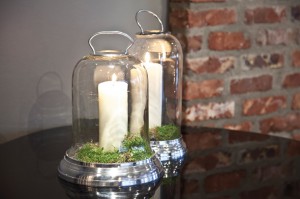 Another fun way to make your home feel warm, festive and full of light is to introduce a few metallic accents. It’s not hard to find accessories in gold, silver, bronze or nickel, and if you can’t find something you like, there’s always metallic spray paint. For about eight dollars a can, you can makeover a beloved but slightly tired objet d’art or give a thrift store find a new lease on life. Gone are the old rules about never mixing gold and silver; these days, the two frequently find themselves in the same room together. Just remember not to get carried away; the key to decorating with metallic accessories is to do so in small doses.
Another fun way to make your home feel warm, festive and full of light is to introduce a few metallic accents. It’s not hard to find accessories in gold, silver, bronze or nickel, and if you can’t find something you like, there’s always metallic spray paint. For about eight dollars a can, you can makeover a beloved but slightly tired objet d’art or give a thrift store find a new lease on life. Gone are the old rules about never mixing gold and silver; these days, the two frequently find themselves in the same room together. Just remember not to get carried away; the key to decorating with metallic accessories is to do so in small doses.
Think About Texture
Touch is the first sense humans acquire and has a powerful effect on our physical and emotional wellbeing. Studies have shown that people who regularly touch others have lower blood pressure and heart rates and healthier immune systems. Touch stimulates the production of oxytocin, which makes you happier, and it activates nerves and hormones that reduce stress.
It’s no wonder that, in the cold, dark winter months, we look for ways to introduce more texture—or touch—into our homes. To give your home a layered look, don’t overlook a single surface. Floors, windows, upholstery and even walls are fair game.
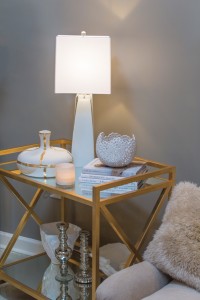 Start with finding a throw blanket that looks as good as it feels. The best throws are so soft they could be mistaken for a long hug. You’ll find throws in cashmere, chenille, wool, cotton—even faux fur. Don’t be afraid to choose something that stands out from the rest of your decor. The beauty of decorating with throws, pillows and other accessories is that everything can be swapped out from season to season.
Start with finding a throw blanket that looks as good as it feels. The best throws are so soft they could be mistaken for a long hug. You’ll find throws in cashmere, chenille, wool, cotton—even faux fur. Don’t be afraid to choose something that stands out from the rest of your decor. The beauty of decorating with throws, pillows and other accessories is that everything can be swapped out from season to season.
While you’re shopping for throws, it won’t hurt to keep your eye out for an authentic sheepskin as well. Sheepskins are versatile; they can be draped across a sofa or chair or placed directly on the floor, either alone or layered on top of another rug. While a sheepskin is not a substitute for a warm throw on a cold night, it does feel luxurious to cuddle up against or sink your toes into, and can add a new dimension to your decor.
Buying throw pillows is one of the fastest and easiest ways to introduce texture into a living room. If you normally go light on throw pillows, winter can be a good time to up the ante, creating a sofa that screams, “Cuddle up!” Choosing down or down-blend inserts will further boost your sofa’s cozy factor. Look for throw pillows in velvet, cable knits and faux furs, and don’t be afraid to mix up your colors and textures.
Faux fur has come a long way in the last couple of years; in fact, it’s getting so good that it’s hard to tell the difference between real fur and its man-made counterpart. If you’re shopping for a faux-fur throw pillow or blanket, look for fur that feels smooth to the touch and retains its shape. Rub your hand along the material—the fibers should bounce back into place.
Think about swapping out your curtains as well. Not everyone’s got the storage space or inclination to change out their curtains with the seasons, but opting for heavy curtains in the wintertime can reduce drafts. Velvet drapes, in particular, look and feel luxurious and can even be hung directly overtop your summertime sheers.
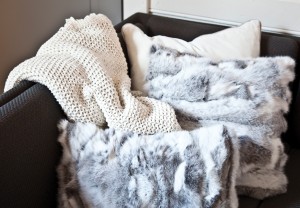 If your home has a lot of exposed wood flooring, winter is the right time to assess whether you’re using enough rugs. Not only will you introduce more texture when you add more rugs, but you’ll also keep your toes warmer and save on your energy bills. To add interest to your space, try layering multiple rugs on top of each other. For the best success, choose a bottom rug that’s at least 12 to 18 inches larger on all sides than the top rug. Also, look for rugs with different textures—think about layering a wool rug on top of a sisal or jute rug, for instance. A faux animal hide looks particularly striking on top of a rectangular area rug because the hide’s irregular shape provides a nice contrast to the boxier rug beneath.
If your home has a lot of exposed wood flooring, winter is the right time to assess whether you’re using enough rugs. Not only will you introduce more texture when you add more rugs, but you’ll also keep your toes warmer and save on your energy bills. To add interest to your space, try layering multiple rugs on top of each other. For the best success, choose a bottom rug that’s at least 12 to 18 inches larger on all sides than the top rug. Also, look for rugs with different textures—think about layering a wool rug on top of a sisal or jute rug, for instance. A faux animal hide looks particularly striking on top of a rectangular area rug because the hide’s irregular shape provides a nice contrast to the boxier rug beneath.
It’s easy to spend the winter months bemoaning the fact that you’re not outdoors. But make these simple changes to your home and you may discover you’ve stopped counting down the days to spring.
Decorative Candles, faux fur, metallic accents, throw blankets, throw pillows, Warm Home Accents






